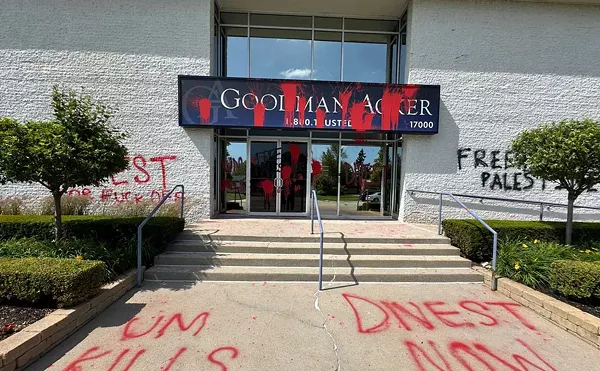
Audio By Carbonatix
[
{
"name": "GPT - Leaderboard - Inline - Content",
"component": "35519556",
"insertPoint": "5th",
"startingPoint": "3",
"requiredCountToDisplay": "3",
"maxInsertions": 100,
"adList": [
{
"adPreset": "LeaderboardInline"
}
]
}
]
When then-Mayor Kwame Kilpatrick's administration announced last summer that it was acceding to the desires of City Council and wouldn't lease the incinerator that has been turning Detroit's garbage into steam and electricity for nearly two decades, many in the environmental community thought their long battle to shut the incinerator had been won.
They were mistaken.
As we've previously reported, the city will still be obligated to send its trash to the incinerator if its private operators can match the cost of sending Detroit's garbage to landfills.
The landfill bids have been evaluated, and a decision will be made within the next 90 days, says John Prymack, director of the Greater Detroit Resource Recovery Authority, which oversees incinerator operations.
But Councilwoman JoAnn Watson thinks resolution of the issue shouldn't be left up to GDRRA, which is run by a board comprised of mayoral appointees.
The council last year passed two resolutions declaring that it wants the city to stop sending its trash to the incinerator. Period. Instead, a majority of council members said they want the city to shift toward a major emphasis on recycling; what doesn't get recycled should go to landfills instead of the burner.
Plans for pilot curbside recycling projects are still in the works, with implementation still months away.
Now Watson is seeking passage of an ordinance that would make it illegal to continue sending city trash to the incinerator. But the Research and Analysis Division (RAD), which provides legal advice to the council, says even if such an ordinance were passed, there's no guarantee the incinerator would be closed when it is paid off at the end of June.
As RAD attorney Tom Stephens told Watson and activists on the environmental justice task force she chairs at a meeting last week, the "almost incomprehensible complexity of the financial structure" involving the incinerator could contain contractual agreements the city would have a hard time voiding.
Part of the problem, says Watson, is that GDRRA — and, by extension, Mayor Ken Cockrel Jr.'s new administration — isn't sharing information council needs. She's not the only one who shares that view.
" ... the ongoing uncertainty about the future of the incinerator, at this late date, and without any clear understanding of the comparative costs of alternative solid waste disposal options such as landfills, makes definite and predictable policy recommendations for Council impossible, without access to full and timely information," a RAD report delivered to council last week states.
The solution, according to Watson, is public pressure. With the upcoming spree of elections, it's possible support of the incinerator could become a poison pill no mayoral candidate can afford to swallow.
"We can't come this far and act like we are powerless," says Watson.
News Hits is edited by Curt Guyette. Contact him at 313-202-8004 or NewsHits@metrotimes.com




